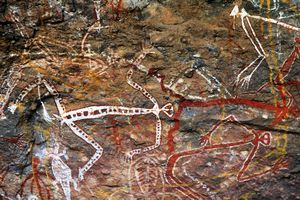Advertisement
Published: November 22nd 2011

 Mimi spirits
Mimi spirits
They are said to live in the rocksCrocs, dingoes, (flaming) galars and other birds, kangaroos, wallabies, sharks, poisonous snakes and spiders, killer jellyfish, bush-tucker, and now, us.
A few simple truths are quickly confirmed to us soon after we arrive in the world’s smallest continent. The variety and diversity of wildlife is inescapable; the landscape is bewildering vast; everyone really does say ‘no worries’.
It’s also a pleasure to reacquaint ourselves with some ‘first world’ pleasures: fresh milk; wholemeal bread; drinkable tap water; wine; enlightened attitudes to recycling; punctual public transport. Of course, it all comes at first world prices. No more eating out twice a day for us – not that we had much choice in Indonesia.
It was a pleasure to be cooking our own food again. We contrarily celebrated our arrival at Alice Springs, the furthest we’ve ever been from the open sea, by making fisherman’s pie, a favourite from back home.
Earlier, on our first day in Darwin, home to over half of the NT’s 200,000 residents, we overhear the TV news announcing that Lonely Planet have designated the city one of the top ten to visit in the world. It does boast an excellent and varied museum, with permanent
exhibits ranging from aboriginal art, natural history and maritime exploration. It’s also home to two attractions that make Darwin somewhat less appealing – a huge (stuffed) saltwater crocodile, and two rooms dedicated to the horrors of cyclone Tracy, which flattened the city on Christmas Day 1974.
So, if you do plan to visit Darwin, avoid ‘the wet’, which runs from December to March. Also, avoid the five or six months a year when the sea is off-limits due to killer box jellyfish. Actually, it’s best to avoid the sea altogether; aggressive saltwater crocs don’t mind what time of year they eat humans.
Another of Darwin’s plus points is this it provides a good base for exploring the ‘Top End’, including two national parks, Kakadu and Litchfield. This means a good base in Australian terms – Kakadu is still a three hour drive away – but it was worth the trip. It’s teeming with wildlife, particularly in the waterways. Take a look at the many pics and you’ll see what we mean.
More to follow in Northern Territory part 2...
Advertisement
Tot: 0.046s; Tpl: 0.012s; cc: 11; qc: 28; dbt: 0.0263s; 1; m:domysql w:travelblog (10.17.0.13); sld: 1;
; mem: 1mb

 Mimi spirits
Mimi spirits





















Victoria
non-member comment
Lonely Planet recommends?
Clearly the Darwin tourist board are sponsoring Tom... Love the photo of the great egret, it's beautiful. Vxx